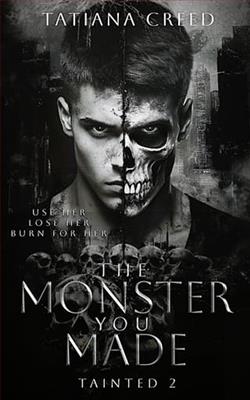Page 96 of Red Flagged
Lachlan rose first, dressed like every rich British bastard I’d ever known—navy blazer, starched white shirt open at the collar, a watch that probably cost three times more than my first kart. His dark blond hair was a little longer than I remembered, artfully disheveled like he’d just rolled out of bed and into a multi-million dollar meeting.
“Fraser,” he greeted with a smirk, shaking my hand and then patting my shoulder. “You're late.”
I glanced down at my watch, then arched a brow at him. “I’m ten minutes early.”
The man behind him stepped forward. This must be Maverick Mercer. Tall, broad, blue-eyed. Rolled sleeves and tailored charcoal slacks. One of his forearms was inked—a cyber sigilist piece that reached down to his wrist.
He looked like money and muscle. Dangerous and expensive. Exactly the man you’d expect to see at a meeting like this.
He extended a hand. “Maverick Mercer. Pleasure to meet you in person.” His American accent was smooth, low, touched by years of exuding power over a glass of bourbon. Every word sounded like a deal closing.
I shook it. “You too.”
“Wasn’t sure you’d come.”
“I wasn’t either.”
They both laughed, but inside I felt like the earth had tilted half a degree to the left. Not enough to throw me off balance, but enough to keep me alert.
We took our seats around a round walnut table centered between two leather chairs and a fireplace that hadn’t been lit but still carried the scent of old smoke. Heavy curtains blockedthe late afternoon sun, casting a dim golden hue across the room. A decanter of scotch sat between us, three glasses already poured.
Beckett handed one to me as he flipped open a thick leather-bound folder and pushed it my way.
He wasted no time. “Orion GP is dead. By the end of this season, the paperwork will be finalized. I’m clearing house—management, branding, culture. New name. New principal. New identity. The bones are there, but it needs some major restructuring.”
“What’s the name?” I asked.
“You’ll find out if you decide to invest. But it’ll be clean, powerful, and legacy-driven. Every corner of that team is getting bleached. The sponsors are already onboard. All that’s left is who’s coming with us.”
He tapped the edge of the folder.
I pulled it toward me, reviewing the three options he’d already sent over in his proposal. “I’ve reviewed it all, and it sounds great on paper. But I want to hear your pitch, Lachlan.” I leaned back in my seat, crossing one ankle over my knee, and took a slow sip of scotch. It was smoky, smooth, the kind of thing you didn’t drink unless you knew what it was worth.
I wished Aurélie were here. Not to tell me what to do, but just to see it. To witness this version of me, the one who was finally starting to believe he could belong in rooms like this. Not just as a driver, but as a leader, a builder, a partner.
I wanted her to see me as more than a man who lived and breathed the track and beyond the mechanical precision of braking zones and apex speeds. I wanted her to see that I could build something, too. That I understood the language of legacy the same way she did. I’d always admired the way she spoke fluent business and brand from her upbringing on her family’svineyard, turning intuition and contract law into art. She was made for strategy. I wanted to show her I could match her.
“Full investment is €150 million upfront,” Beckett said. “That gets you thirty percent equity, full voting rights, a seat at the table for every major decision—driver selection, technical partnerships, marketing, supplier contracts, all of it. You’ll be hands-on. Not a face on a poster.”
He tapped the open page with a blunt finger. “I’ll retain thirty-one percent. That keeps majority control for board sign-off. Maverick comes in at thirty. The remaining nine is split—five to a silent partner on my side, and four to the fund acquiring their team principal’s remaining shares.”
I scanned the page. “And voting weight?”
“Even. All decisions require a majority. No single one of us can push something through without at least one other signature.”
Maverick spoke up then, his voice smooth and confident. “I’m not a motorsport guy by nature, Fraser. I deal in acquisitions and clean-outs. Rebrands are my specialty, especially when it comes to companies with a lot to hide.” He paused, taking a slow sip of his scotch. “But my wife, Sophie, is with Interpol. She’s overseeing the investigation into Orion’s financials and the data integrity breaches that led us here. That work is ongoing.”
His tone sharpened, just slightly. “Financial crime isn’t usually her domain, but this? This has teeth. There are layers to it. Falsified telemetry, bribery, alleged sabotage. And she's not just looking at the money trail. She’s doing a moral deep dive. There’s rot in the walls, and we’re not just going to paint over it. We’re gutting it.”
I leaned forward slightly, glass resting against my knee. “And you trust that’s possible?”
“I do,” he said, then added, “because I trust her.”
I studied him. “What’s her background?”
Maverick didn’t flinch. “Sophie was a detective with the Newark Police Division. She left the force after getting sick of the red tape. Went freelance and embedded herself in sex trafficking investigations across the States. Often without jurisdiction, which didn’t earn her many friends.”
“She sounds relentless,” I said.















